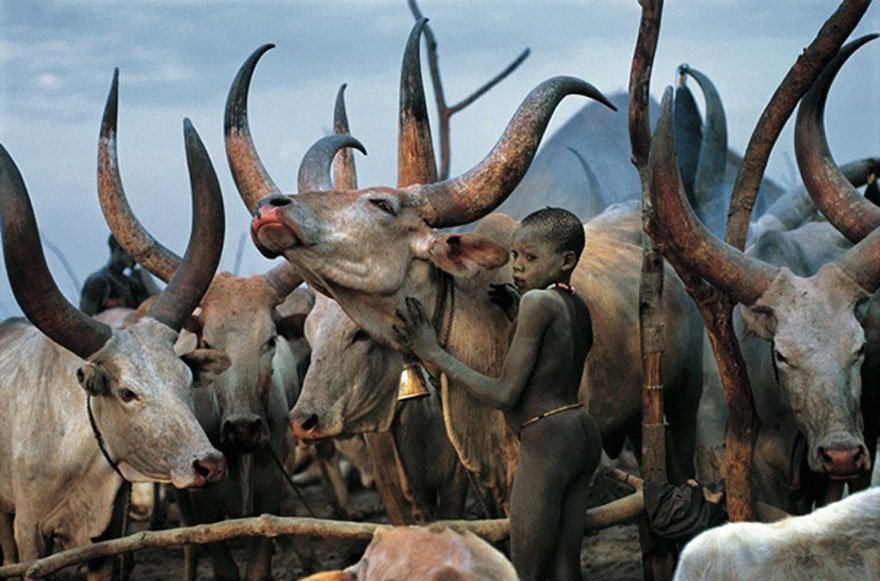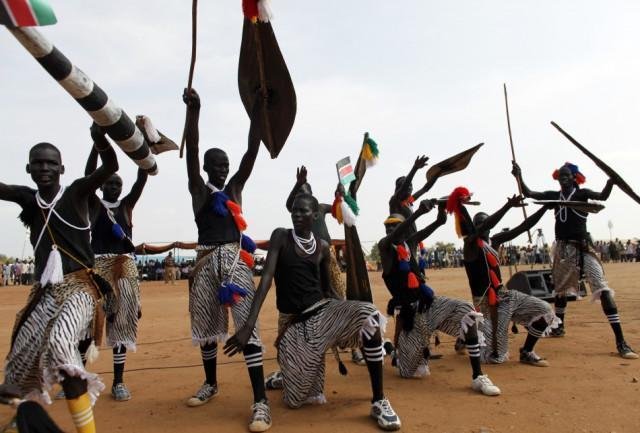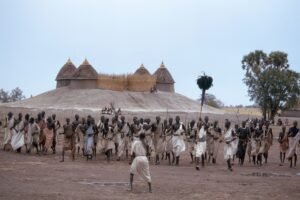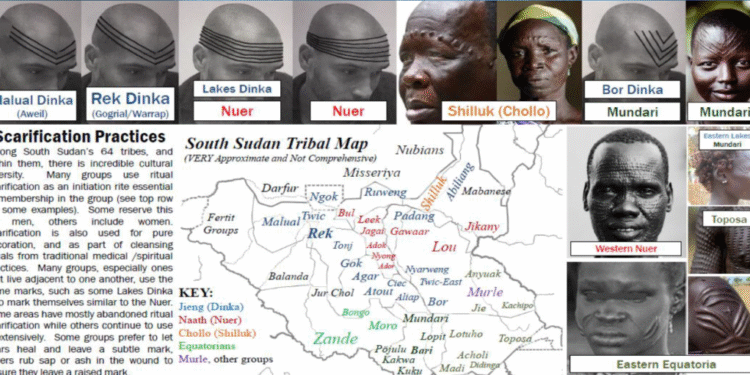Dinka. The Dinka tribe constitutes the biggest ethnic group of South Sudan and probably counts for almost 40% of the population. They are pastoralists and let their cattle graze on the Greater Bahr el Ghazal, in the Pariang County in Unity, in and North of Bor as well as along the Eastern shore of the Nile in Upper Nile State. These geographical divisions reflect themselves into political rivalries among the different Dinka subgroups. While the historical leader of the SPLM, John GARANG, as well as the core leadership of the uprising, came from the Bor area the current President Salva KIIR comes from Greater Bahr el Ghazal (Gogrial in Warrap), which might at times lead to political disagreement. Several other ethnic groups have repeatedly accused the Dinkas of using the South Sudanese institutions to advance a tribal agenda.
Dinka constitutes the majority ethnic group in South Sudan

Nuer. The Nuers are pastoralists and count for about 30% of the South Sudanese population. While the Unity State, with the exception of the Pariang County, is inhabited by the Nuer people, most of them live on the Eastern side of the Nile, in Southern Upper Nile, Northern Jonglei, and Western Ethiopia around Gambella. The former vice president and current SPLM in opposition, Riek Machar, is a Nuer from Leer in Unity, while the military commander of the SPLA in opposition, Peter Gadet, originates from Mayom, the hometown of the Bull Nuers. The Nuer culture is very similar to the Dinka customs but distinguished itself by a very particular set of traditional believes and superstition as well as by a very efficient mobilization process of the youth in order to fight. Since the end of the 19th century, several Nuer prophets, following Ngundeng Bong, appeared among the Nuer people and spread well-remembered prophecies. As of June 2014, Dak Kueth, a native of the Yuai area in Jonglei, continues to be recognized as an active prophet and exercises considerable influence over the cattle camp youth. Riek Machar reportedly possesses the “magical” stick of the original Ngundeng Bong prophet. While they seem to show greater solidarity than the Dinkas, the Nuer are also divided into subgroups. Most of the Bul Nuer from Mayom, for instance, openly supported the Juba government in the crisis in June 2014.

Murle. The Murle Tribe constitutes a relatively small (about 160 000 persons) ethnic group of pastoralists living in the Greater Pibor Administrative Area (formerly Pibor County). Depending on the season, besides the cattle, they will get their food from the river (fishing), the forests (wild honey and herbs), agriculture (sorghum) of the game (the Kob migration). While the Dinkas and the Nuers share many linguistic and cultural similarities, the Murle speak a totally different language and have developed a unique culture due to their geographical isolation in the swamps of the eastern

Jonglei. They don’t respect an established permanent political structure among the tribe, but the men’s loyalty goes to the age set (or generation) they belong to. The “dominant” generation gathers the men from about 20 to 30 years old and forms the warrior age set defending the tribe (and raiding the cattle of their neighbors at times). As of June 2014, the Botonya generation is being contested by the younger Lango age set. Due to their marginalization and fierce and independent culture, the Murles participated in several uprisings in the past. David Yau Yau, from the Botonya generation, led the last armed rebellion against the Juba government until his group was finally integrated into the government forces in early 2014.
Shilluks live on the Eastern side of the Nile in Upper Nile State and respect the authority of a customary king. Due to the marginalization by the Juba authorities, some Shilluk leaders such as Olony and Ogat led an armed rebellion against the government of South Sudan until agreements were reached in 2013. The exact status of the different Shilluk armed groups, however, remains largely unclear and the Shiluks/Collo declared in February 2014 the creation of a new Shilluk self-defense group.

The amount of Dinkas living in Juba is misleading, as the original people living in the area of the capital and further North towards Bor are the Bari and the Mundari. Although they possess cattle, they are mainly farmers and complain about the frequent incursions from the Bor Dinka cattle keepers into their territory. This is a general concern for most of the farmers of the three Equatoria States: the Zande in Western Equatoria complain about the Dinka incursions into their farmlands while the Topposa in eastern Equatoria has a border dispute with the Jonglei State. The Topposas constitute an exception in the Equatorias because of their pastoralist culture and their historical involvement in wars.
Other relevant ethnic groups. The Fertits are farmers living west and south of Wau and have an old as well as the recent history of violent clashes with the Dinka administration of Western Bahr el Ghazal.
Chosen from among all others by the Immortal Elders – Solomon, Hercules, Atlas, Zeus, Achilles, Mercury – Billy Batson and his mentor travel the highways and byways of the land on a never-ending mission: to right wrongs, to develop understanding, and to seek justice for all! In time of dire need, young Billy has been granted the power by the Immortals to summon awesome forces at the utterance of a single word – SHAZAM – a word which transforms him in a flash into the mightiest of mortal beings, Captain Marvel!












